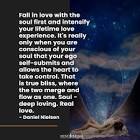Love and Experience: The Beautiful Bond
Love is a universal language that transcends time, culture, and age. It is a deep and profound emotion that has the power to transform lives and create lasting connections. While love can be experienced by people of all ages, there is something uniquely special about the love that comes with experience.
When we talk about love and experience, we are referring to the relationships formed between individuals who have lived a significant portion of their lives. These connections often involve older individuals who bring with them a wealth of wisdom, understanding, and maturity.
One of the most remarkable aspects of love and experience is the depth of emotional connection it offers. With age comes a greater understanding of oneself and others. Life’s ups and downs have taught these individuals valuable lessons about empathy, compassion, and patience. They have learned how to navigate through challenges and appreciate the beauty in simple moments.
Love between experienced individuals often blossoms from a place of mutual respect and admiration. They have learned to appreciate each other’s strengths and accept their flaws with grace. There is an understanding that true love requires effort, compromise, and genuine care for one another.
In these relationships, there is a sense of security that stems from knowing oneself better. Experienced individuals tend to have a clearer idea of what they want from a partner and are less likely to get caught up in superficial aspects of attraction. They value emotional connection over fleeting infatuations.
Love that comes with experience also brings with it a deeper appreciation for life’s little joys. These individuals understand the importance of cherishing every moment spent together because they know how quickly time passes. They savor simple pleasures like holding hands, sharing laughter, or enjoying quiet evenings together.
Moreover, love between experienced individuals often extends beyond mere romance. It becomes an anchor during challenging times, providing support during difficult moments in life. These relationships offer companionship through thick and thin – someone to lean on when the world feels overwhelming.
However, it is important to remember that love and experience are not exclusive to older individuals. Love can be found at any stage of life, and experience can be gained through various avenues. Whether it’s through personal growth, overcoming hardships, or learning from past relationships, everyone has the potential to cultivate a deep and meaningful connection.
In conclusion, love and experience form a beautiful bond that enriches the lives of those involved. It is a connection built on mutual understanding, respect, and appreciation for life’s journey. Whether we find love later in life or embrace it at a younger age, let us cherish the wisdom that comes with experience and open our hearts to the transformative power of love.
Exploring Love: Answering 4 Common Questions about the Experience
- Do people experience true love?
- What is the meaning of the experience of love?
- Why love is a human experience?
- How can someone experience love?
Do people experience true love?
The concept of true love is subjective and can vary from person to person. Some individuals believe in the existence of true love, a deep and unconditional connection that transcends time, while others may be more skeptical or have different interpretations of what true love means to them.
For those who do believe in true love, they often describe it as a profound and intense emotional bond that goes beyond physical attraction or infatuation. It is a connection that involves understanding, acceptance, and unwavering support for one another. True love is often characterized by trust, respect, and a deep sense of companionship.
However, it is important to note that experiencing true love does not mean that a relationship will be without challenges or difficulties. Relationships require effort, compromise, and continuous growth from both individuals involved. True love does not exempt couples from disagreements or conflicts but rather provides a strong foundation to navigate through these obstacles together.
It’s worth mentioning that the experience of true love can also evolve over time. As individuals grow and change throughout their lives, so too can their understanding and perception of what constitutes true love. What may have been considered true love in one stage of life might evolve into something deeper and more meaningful as personal experiences shape perspectives.
Ultimately, whether people experience true love or not is subjective and can vary from person to person. It depends on individual beliefs, values, experiences, and the connections they form with others. What matters most is finding genuine happiness and fulfillment in relationships based on mutual respect, understanding, and shared values.
What is the meaning of the experience of love?
The experience of love is a deeply profound and complex emotion that can have different meanings for different individuals. At its core, the meaning of the experience of love revolves around the intense emotional connection, affection, and care that one feels towards another person.
Love encompasses a variety of feelings, including passion, intimacy, trust, and empathy. It involves a deep sense of attachment and a desire to nurture and support the well-being of the person we love. Love can bring immense joy, happiness, and fulfillment into our lives.
The meaning of the experience of love extends beyond romantic relationships. Love can be felt for family members, friends, pets, or even for humanity as a whole. It is a force that drives us to connect with others on a deep emotional level and to form meaningful bonds.
Love has the power to inspire us to become better versions of ourselves. It encourages personal growth, selflessness, and compassion. Through love, we learn to understand and accept both the strengths and flaws of ourselves and others.
The experience of love can also bring vulnerability and challenges. Opening ourselves up to love means exposing our deepest emotions and risking potential heartbreak or disappointment. However, it is through these challenges that we learn valuable lessons about resilience, forgiveness, and personal growth.
Ultimately, the meaning of the experience of love lies in its ability to bring profound joy, connection, understanding, and fulfillment into our lives. It is an essential part of being human – a powerful force that enriches our existence and gives us purpose beyond ourselves.
Why love is a human experience?
Love is a human experience because it is deeply rooted in our nature as social beings. As humans, we possess the capacity for emotional connection, empathy, and the desire for companionship. Love allows us to form meaningful bonds with others, fostering a sense of belonging and fulfillment.
One of the fundamental aspects that make love a human experience is our ability to feel and express emotions. Love encompasses a wide range of emotions, such as affection, compassion, joy, and even vulnerability. These emotions are uniquely human and play a crucial role in shaping our relationships.
Love also involves the ability to empathize with others. It allows us to understand and share in the joys and sorrows of those we care about. This empathetic connection helps us form deep emotional bonds with others by recognizing their needs, desires, and struggles.
Furthermore, love serves as a driving force for human connection and social cohesion. It motivates us to seek out companionship, build families, and form communities. Love provides a sense of support, security, and intimacy that nurtures our overall well-being.
Additionally, love has the power to inspire personal growth and transformation. It challenges us to be selfless, compassionate, and understanding towards others. Through love’s influence, we learn valuable lessons about forgiveness, patience, compromise, and acceptance.
Love is also an essential aspect of our search for meaning and purpose in life. It gives us a sense of fulfillment by allowing us to experience deep connections with others on an emotional level. The bonds formed through love provide comfort during challenging times and amplify moments of joy.
Moreover, love has been a subject of exploration in various art forms throughout history – from literature to music to visual arts – highlighting its universal significance as a human experience. It serves as inspiration for countless stories that depict the complexities and beauty of human relationships.
In conclusion, love is undeniably a human experience because it taps into our innate capacity for emotional connection, empathy, and the desire for companionship. It shapes our relationships, fosters personal growth, and provides a sense of purpose and fulfillment. Love is a powerful force that defines us as social beings, contributing to our overall well-being and enriching the human experience.
How can someone experience love?
Experiencing love is a deeply personal and unique journey for each individual. While there is no one-size-fits-all approach, here are some fundamental ways in which someone can open themselves up to experiencing love:
- Self-Reflection: Start by understanding and loving yourself. Take the time to explore your own desires, values, and goals. Cultivate self-acceptance and self-care practices that nourish your well-being. When you have a strong foundation of self-love, you are more likely to attract and recognize genuine love from others.
- Openness and Vulnerability: Love requires vulnerability. Be open to connecting with others on an emotional level, sharing your thoughts, dreams, fears, and aspirations. Allow yourself to be seen for who you truly are, embracing both your strengths and vulnerabilities.
- Building Connections: Engage in activities or join communities where you can meet like-minded individuals who share similar interests or values. Attend social events, participate in hobbies or volunteer work that aligns with your passions. By putting yourself out there, you increase the chances of forming meaningful connections.
- Communication: Effective communication is vital in building and sustaining love relationships. Express your feelings openly and honestly while actively listening to your partner’s thoughts and emotions. Healthy communication fosters understanding, trust, and emotional intimacy.
- Patience: Love takes time to develop and grow into something meaningful. Be patient with yourself and others as you navigate the complexities of relationships. Allow the connection to evolve naturally without rushing or forcing it.
- Learn from Past Experiences: Reflect on past relationships or experiences to gain insights into what worked well and what didn’t. Use these lessons as stepping stones for personal growth and to make informed choices when it comes to love.
- Practice Empathy and Compassion: Love involves understanding and caring for another person’s needs, emotions, and perspectives. Cultivate empathy by putting yourself in someone else’s shoes and showing compassion towards their experiences. This helps create a nurturing and supportive environment for love to flourish.
- Embrace Imperfections: Love is not about finding someone perfect, but rather accepting and embracing each other’s imperfections. Recognize that everyone has flaws and make room for growth, forgiveness, and understanding within the relationship.
Remember, love is a journey that unfolds uniquely for each person. It may require patience, self-discovery, and taking risks. By being open to the possibilities and investing in personal growth, you increase your chances of experiencing deep and meaningful love connections.

